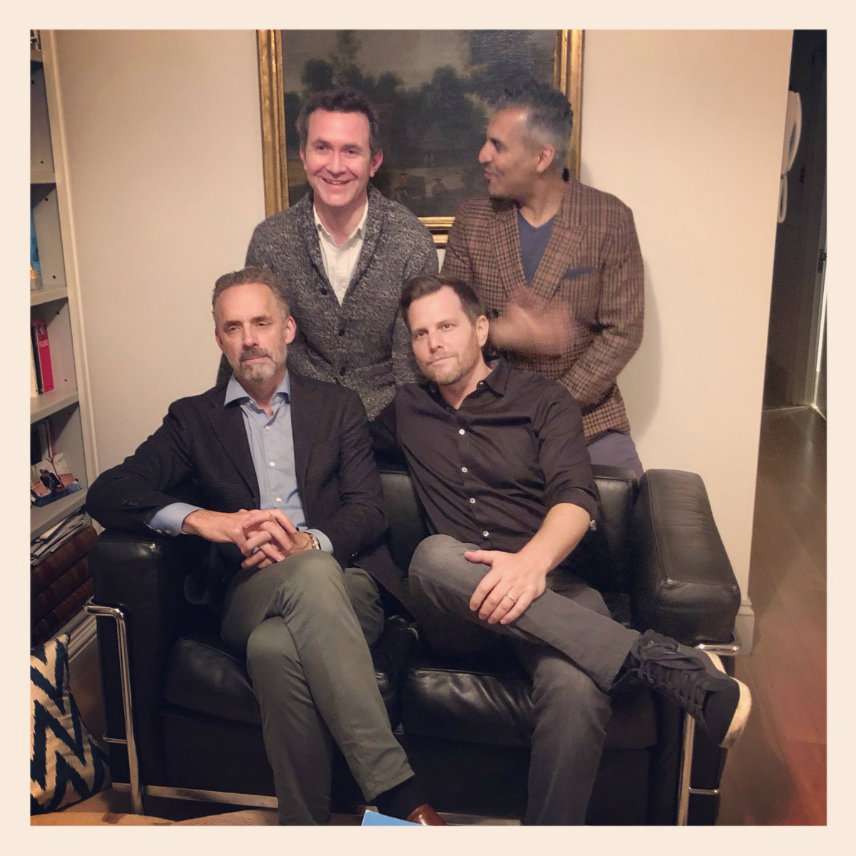The 'Intellectual Dark Web' Is Just Rehashing Old P.C. Controversies in New Media
The leading figures of the "Intellectual Dark Web" are incredibly popular. So why do they still feel so aggrieved?


They can be found gracing high-profile cable-news shows, magazine opinion pages, and college speaking tours. They've racked up hundreds of thousands of followers. And yet the ragtag band of academics, journalists, and political pundits that make up the "Intellectual Dark Web" (IDW)—think of it as an Island of Misfit Ideologues—declare themselves, Trump-like, to be underdogs and outsiders.
Mathematician Eric Weinstein, managing director of Thiel Capital, coined the term Intellectual Dark Web some while back, but it only became a subject of mass controversy after Bari Weiss published a recent New York Times profile of the crew. Weiss lumps Weinstein, his evolutionary biologist brother Bret, and about a dozen other high-profile, often controversial folks in the IDW ranks, including "New Atheism" guru Sam Harris, American Enterprise Institute scholar Christina Hoff Sommers, comedian Dave Rubin, conservative pundit Ben Shapiro, author and academic Jordan Peterson, and Quillette founder Claire Lehmann.
A diverse group in terms of work backgrounds and political leanings, what they share is a disdain for modern center-left orthodoxies—and a view of themselves as victims of unfortunate and intensifying forces: identity politics, feminist militancy, transgender activism, illiberalism around speech.
"A decade ago, they argue, when Donald Trump was still hosting The Apprentice, none of [their observations] would have been considered taboo," Weiss writes. They don't see this as a product of failing to keep up with cultural tastes, new research insights, or shifting ideas about identity but a sign of "political correctness" bordering on hysteria in mainstream media and academia, a confirmation that the "truths" they speak are more reviled—and necessary—than ever.
The IDW view of their evolving position seems, at minimum, like a selective remembering of recent history. Figures like Harris and Sommers have been controversial for most of their careers, and certainly no one was rolling out the mainstream political welcome wagon for them a decade ago. If anything, both are less fringy figures now than they were 10 years ago.
The last decade was also littered with battles about evolutionary biology and psychology, debates that built on gender wars started decades earlier. Just how physiologically different males and females are and how much this matters has long been a subject of intense and fraught debate; it is not some newfangled concern that millennial SJWs have suddenly seized. Similarly, partisans have been debating political correctness on college campuses for decades.
I don't buy the notion that IDW ideas are only now becoming beyond the pale. Nor am I convinced that they're actually so taboo these days.
As Weiss points out, this is a crowd that has built followings on new-media platforms like YouTube and Twitter rather than relying solely on legacy media, academic publishing, and other traditional routes to getting opinions heard. (There isn't much that's new about this except the media involved. Conservatives have long been building large audiences using outside-the-elite-media platforms such as talk radio, speaking tours, and blogs.) In doing so, they've amassed tens and sometimes hundreds of thousands of followers. What they are saying might not be embraced, or even endured, by legacy media institutions or certain social media precincts, but it's certainly not out of tune with or heretical to many Americans.
The bottom line is there's no denying most of these people are very popular. Yet one of the few unifying threads among them is a feeling or posture of being marginalized, too taboo for liberal millennial snowflakes and the folks who cater to them. "The I.D.W. emerged as a response to a world where perfectly reasonable intellectuals were being regularly mislabeled by activists, institutions and mainstream journalists," Eric Weinstein told the Times.
The other thing the IDW crowd seems to share is their response to this perception.
Presenting themselves as brave and imperiled truth sayers facing down an increasingly "politically correct" populace, they offer their fans an immensely appealing proposition: It's not you, it's them, and liking us is a sign that you are not like them. We are rational, radical where it's called for, able to take a joke, and part of America's great intellectual tradition—everything the speech-policing, biology-denying left is not. And anything we say or share that angers the left is just proof of how insane they have become.
There are indeed a lot of loony people on the left, as there are in most ideological spheres. And college kids have indeed mounted some passionately stupid crusades in the past few years. Pushing back against these people, exposing their hypocrisies, and riling up outrage over their antics is sometimes necessary and often fun. It is always good for garnering attention. But it is also easy—and it is not enough.
The only way to produce lasting change is to use less shock and shame, more showing people on their terms why your way forward can help. It requires the empathy that allows for projecting the best intentions on your enemies, the patience to actually strive for common ground or conversion instead of simply writing people off as hopeless dummies, the ability to shed your ego enough not to need to "own" those who disagree with you, and the confidence to call out any entity—especially among one's "side" or allies—that stands athwart your version of good.
As a political and ideological minority, libertarians have long had to learn these skills to make any headway. We end up in a lot of coalitions with a lot of fair-weather friends. We know perhaps better than anyone else that there are authoritarians on both the right and the left who want to use state power to impose their versions of good and right on the rest of us; that for all they dress up this impulse in talk of religion or tolerance or tradition or anti-P.C., the bulk of both sides would sooner their side "win" than promote policies where someone, anywhere, isn't following their preferred rules; and that most people want easily categorizable heroes and villains, not to rethink any fundamental assumptions while thumbing through Twitter. That's precisely why this Intellectual Dark Web crowd is so perfectly tailored to these times: Their type of hereticism doesn't require much.
Blanket proclamations about those labeled IDW are of couse tricky, since the group is not only diverse in political affiliations and areas of expertise but also riddled with outliers. Quillette's Lehmann stands out as less inflammatory and condescending than others. Bret Weinstein also seems more willing than most IDWers to offer olive branches and exhibit a capacity for basic kindness. Lehmann, Weinstein, and a few others Weiss names (including author and academic Alice Dreger, who explains why she declined to be included in the New York Times article here) at least come across as more interested in truth and discourse than clicks and glory. On the other end of the tone spectrum, we have folks like Peterson, Rubin, and Shapiro, whose public personas are built around being deliberately provocative.
"Israelis like to build," reads one Ben Shapiro tweet*. "Arabs like to bomb crap and live in open sewage." Shapiro is also fond of pointing out on the regular that he thinks trans people shouldn't have the right to self-determination.
Peterson, a psychology professor at the University of Toronto, skyrocketed to international renown for refusing to address transgender students by their preferred pronouns. His YouTube videos and recently published self-help book are full of sensible advice—interspersed with wisdom about how all feminists have "an unconscious wish for brutal male domination," rants against postmodernism (which has reached almost mythical megavillain status in Peterson's worldview), threats to hit other academics, and goofy parables about lobsters.
Basically, Peterson is like the ideological equivalent of a fad diet: The basic advice is sound—and it may even help you reach your goals—but you could skip the more esoteric elements, like eating for your bloodtype or believing that wearing lipstick in the workplace is asking to be sexually harassed, and wind up in the same place.
Rubin regularly makes absurdly reductionist statements about various groups he opposes ("The leftist media hates gamers" because "they don't like people who solve problems"), relies on bastardized evo-psych to make his points (today's gender norms are good because they've existed "from our hunter-gather days"), and makes videos that instruct people on how "trigger" progressives.
The "red meat" for IDW fans is undeniably tales of liberal lunacy and P.C. culture run amok. This is what unites the Republicans and Democrats, pundits and professors, etc., in their worlds. It's this, not tempered critiques and not substantive analysis, that leads to views, clicks, retweets, likes, fans, followers, and speaking invites.
There's nothing innately wrong with playing to what the crowd wants—all of us in media make that calculation in a hundred ways each week. But when "the reward structure is for precisely when you are out there transgressing" and engaging in taboo subjects, "it's hard not to become corrupted…in that process," as Matt Welch commented last week. When your fan base is predicated largely on serving up quickly digestible, dopamine-triggering outrage day after day, week after week, it's very easy to lose perspective, to pander to their (and your own) worst impulses, and to wind up engaging with only the most ridiculous of the other side's arguments. To spend less and less time on the things you want to change and more and more on how stupid the things that other people want to change are.
It is not a career model that encourages nuance, niceness, or introspection. This is also fine; plenty of people make media careers peddling what the market wants, not trying to reveal injustices, speak radical truths, or change the world. Where some of the IDW crowd can become insufferable is doing the former while insisting it's doing the latter.
Another annoying (and unproductive) tick I've found in my personal dealings with and observations of IDW types is their insistance on drawing strict lines around themselves and The Other Side that are based more on aesthetics than shared policy platforms. Criticize a racist joke (without calling for it to be censored)? You must be part of the regressive left! Think mainstream feminism is often misguided but probably not a "cancer"? SJW! Never mind if you're every bit the First Amendment absolutist that IDWers claim to be; a refusal to pantomime the right hate will get you booted from IDW esteem right quick.
It's a tribalistic tendency totally at odds with their professed reverence for individualism and hatred of "identity politics." It mars the best messages and tendencies of IDWs—respect for free speech, rejection of over-the-top wokeness, skepticism toward bureaucracies and big government—by framing support for these things as conditional on sharing other, more controversial IDW calling cards. Ultimately, this leaves as little room for winning new converts and starting new coalitions as with their scolding, screeching progressive counterparts.
The supposed ostracism they suffer because of their views ultimately comes down to a complaint not about censorship or exclusion but being attacked, challenged, or denied very particular opportunities. They want to say the things they are saying and have the marketplace of ideas and attention not only reward them with followers and freelance writing gigs but universal acceptance from those that matter in the academy and chattering classes.
They want not so much any particular policy platform, political idea, or candidate to catch on as for more people to acknowledge that they are right. And that will always be a proposition that winds up making one feel aggrieved, because it's an impossible one. To the extent that they are spouting marginalized or unpopular ideas, the only way to spread these into the mainstream is to put in the hard work of winning people over.
*CORRECTION: This piece previously said that Shapiro had deleted the tweet in question; he did not.


Show Comments (368)